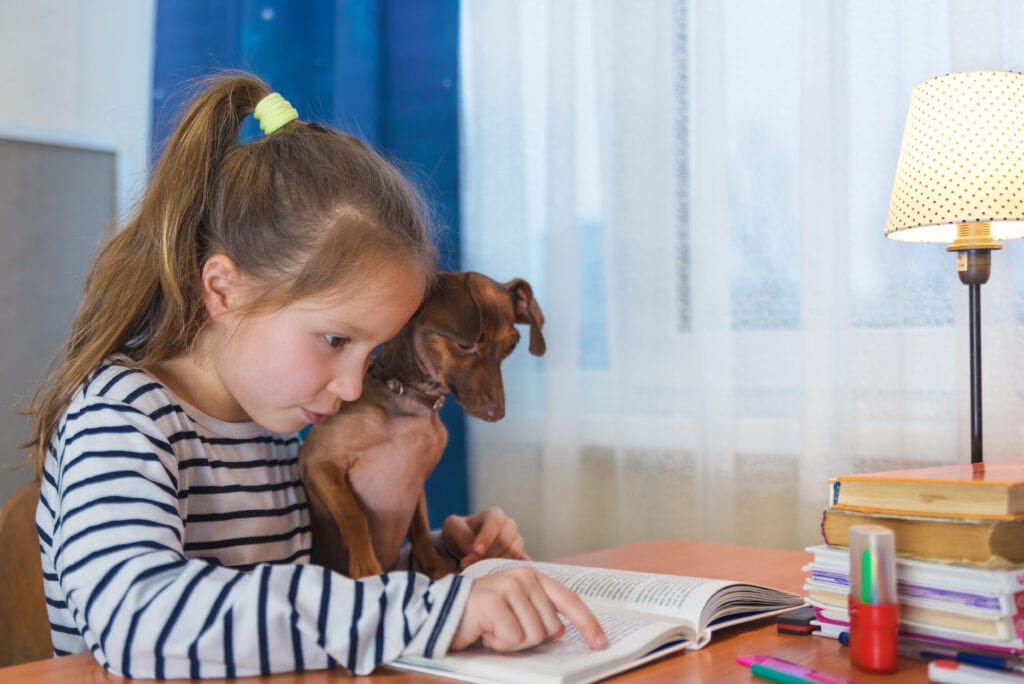In Australia, pets outnumber people by several million. Australia is home to an estimated 29 million companion animals, with two-thirds of households having at least one pet. In fact, Australia has one of the highest rates of pet ownership in the world! Are we on to a good thing? Let’s take a look at the benefits of companion animals for kids.
Does my child need a pet?
Chances are, they want one!
If you don’t already have pets in your household, your child has probably asked for one many times. Kids love the idea of animal companions; they can be cute, cuddly, entertaining … but often mean more work for mum and dad. Before you put your foot down and say no, research has shown that children can benefit from animal ownership in many ways.
The best of friends

A pet will never exclude your child or deliberately hurt their feelings. Children who struggle with loneliness and physical isolation can find a special friendship with an animal, bird, fish, or reptile.
Pets also make the best confidantes. A child can talk through a problem with a pet and know that they won’t be judged. When a child has a pet, there is always someone to share their feelings with.
Pets are great reinforcers of self-esteem!
Social growth

Having a pet gives children something to talk about. Children find it easier to form friendships when they have a common love of cats, dogs, guinea pigs, mice, fish, birds, or whatever exotic pet or pocket pet they may own.
Meeting up with friends to walk the dogs together is a wonderful opportunity for play and conversation. Older children can get together to teach their pets tricks, or meet like-minded friends at local pet shows.
Pets are great confidence boosters!
Emotional growth

When a living creature is dependent on you for their every need, the opportunity for personal growth is limitless.
Understanding when a pet is tired, hungry, playful, sick or uncomfortable helps your child develop appropriate responses, care, and nurturing.
Discussing the consequences of forgetting to refill a water bowl, or asking your child to think how they might feel if they were ignored and not played with, helps your child build empathy and become aware of the need to respect other forms of life.
Your child will also learn about important choices, like choosing to miss out on a toy or event because a pet needs veterinary care or attention.
Choosing to adopt a pet from a shelter is a great lesson in compassion, and very rewarding for both your child and their pet.
Intellectual growth

A pet can also encourage stillness and focus. For example, children who are learning to read love to read to their pets.
Reading because you must sign off your homework sheet is not nearly as appealing as reading to an animal, and children often find it less stressful and more purposeful to read to their pets. Instead of reading to an authority figure (parent or teacher), children become the authority figure, with the freedom to read at their own pace and develop their own character voices and sound effects.
Having a quiet pet by their side can also help children stay focussed on homework until the task is completed.
Happy and healthy

There are lots of scientific studies that prove pets are good for your health! Contact with animal fur and saliva from an early age can significantly reduce a child’s risk of developing allergies and may help prevent asthma.
Certain pets also encourage outdoor activity, like playing with the guinea pig in the garden and taking the dog to the beach. Being outdoors in the fresh air is great for physical health and mood, and playing with pets provides the perfect opportunity.
Being responsible

Taking care of a living being is a huge responsibility. Pets need attention, exercise, an appropriate diet, healthcare, and a clean safe environment. Pet ownership is a big commitment, and pets can’t be put back in the toy box and forgotten about when a new distraction comes along.
While the majority of care will inevitably fall to the parents, finding age-appropriate tasks that your child can do, such as feeding the pets and providing fresh water, cleaning out cages, and playing with pets helps your child develop a routine of responsibility.
Lessons on life

Owning a pet inevitably comes with life lessons. From an infant pet that needs toilet training and socialisation, through potential illnesses and accidents, to old age and death, your child will witness a whole life cycle over the space of a few years.
As sad as the event may be, dealing with the death of a pet can help your child cope with other challenging life events as they grow.
Companion animals are fun!
So we see that there are psychological, social, intellectual, and health benefits to pet ownership, but above all, pets are fun! A pet – or multiple pets – brings enjoyment to any household.
At Families Magazine we encourage responsible pet ownership. Before introducing a pet to your family, please consider the type of pet you want, its lifespan, health and environment requirements, cost of food and veterinary care, your child’s age, and you family’s lifestyle. We love a happy tale, so please choose to adopt a pet if you can.
Wondering what the best family dog is? We know!
This article was featured in Issue 53 of our printed magazine, Aug/Sept 2022.

